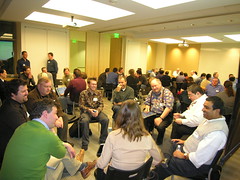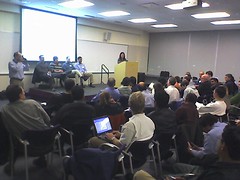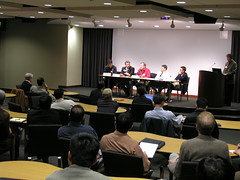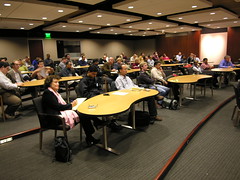Niall’s first SF Tech Session last night was a hit. Oh so glad to have this kind of event in the city rather than the peninsula. It’s now a recurring event on my calendar, and I encourage anyone nearby to check it out next month.
Speaking of calendars, last night’s session brought three Groupware 2.0 startups in for a smackdown, er, joint presentation: Kerio, Joyent, and Zimbra. Robert Anderson and Tom Bridge have comprehensive summaries of each presentation. Here’s my take.
At their heart, all three are vying for their piece of the Groupware market, currently dominated by MS Exchange, IBM/Lotus, and Groupwise (having 93% of the market combined). But one level down, these startups take very very different approaches.
» Kerio is an Outlook/Exchange clone for the web, and looked very nice as far as Outlook clones for the web go. But really not interesting in 2006 from where I sit.
 » Zimbra is open source and wants to be the Linux of Groupware, They started off boasting of their 100,000 seat deployment to H&R Block, and after the demo I can see why they’re getting that kind of traction so soon after launch 6 months ago. The app (web client + server) is incredibly fast, ajaxy-interactive, and in general a well thought out integration of shared email, calendars, and little apps called Zimlets.
» Zimbra is open source and wants to be the Linux of Groupware, They started off boasting of their 100,000 seat deployment to H&R Block, and after the demo I can see why they’re getting that kind of traction so soon after launch 6 months ago. The app (web client + server) is incredibly fast, ajaxy-interactive, and in general a well thought out integration of shared email, calendars, and little apps called Zimlets.
A Zimlet is a better, Ajaxy versions of a Zaplet. Zimlets allow integration with external systems at both the client and server. Code runs on the server to do the heavy-lifting of connecting to web services etc., but the real joy is their approach to client integration.
From the demo, client integration happens in two ways. First, Zimlet icons can accept email and calendar drag-n-drop events to kick off the appropriate activity based on what was dropped.
The second method is more tasty. A Zimlet can parse your email content and present previews and links based on the info it recognizes as interesting. They demoed recognizing addresses to pop up Y!Maps and recognizing PO numbers to automagically pull in PO info from an external order entry system. This was more than read-only integration — the popup presented an “approve” button to allow the user to take action.
Suffice to say I was impressed, and it beats the pants off the webmail.us service we’re using at JotSpot. I hate that thing.
Zimbra is about to announce hosting partnerships, so look out for that.
 » Joyent, in contrast, is Groupware 2.0 for small teams. Zimbra’s 100,000 user deployment pitch is very different than Joyent’s pitch as a hosted service with an offering that maxes out at 25 people. Want 50 people? Buy two 25–packs for now. (Note: they’re working on alternate approaches to this limit, or you can buy and host your own “Accelerator” appliance). Question the approach, but I admire a company that knows its target customer and sticks to it.
» Joyent, in contrast, is Groupware 2.0 for small teams. Zimbra’s 100,000 user deployment pitch is very different than Joyent’s pitch as a hosted service with an offering that maxes out at 25 people. Want 50 people? Buy two 25–packs for now. (Note: they’re working on alternate approaches to this limit, or you can buy and host your own “Accelerator” appliance). Question the approach, but I admire a company that knows its target customer and sticks to it.
Of the three, Joyent definitely impressed me the most from a product perspective for two reasons.
First they’re evangelizing “cubicle security”, aka everything is open by default. The premise is that small teams work better when they share their inbox/calendar/people/files/pages, so why not default to “shared” rather than closed?
This worked for Flickr, but the jury is out if this works for your team. They claim it works for current customers, and I actually agree in theory (except for the inbox part). This default-to-public of course affects the interface in all sorts of subtle ways, which is one of the reasons it feels like a fresh, innovative product. (Note: you can privatize anything — it’s just not the default.)
Second is the interface itself. It’s very well laid out, and the mail/calendar/people/file/pages/??? tabs all share an integrated look and feel and set of interaction metaphors. For example they’ve gone hog-wild and made everything possible an RSS feed, and have taken a blogish comment approach to the reply-all email thread nightmare. You don’t reply, you just comment. I can see these things being the right approach to integrating this suite of apps.
It will be interesting to see where Joyent take this as a platform. Their Ruby on Rails foundation, combined with their underlying hosting service (Textdrive) hints at interesting extension and partnership possibilities. I wonder where they’ll take the core mail/calendar/files interface next…
tags: collaboration, joyent, kerio, groupware, sftechsessions, zimbra
 Launched
Launched




 »
» »
»














 I'm heading to
I'm heading to 



 Just had lunch with
Just had lunch with 

 out. Oh, and parties too.
out. Oh, and parties too.